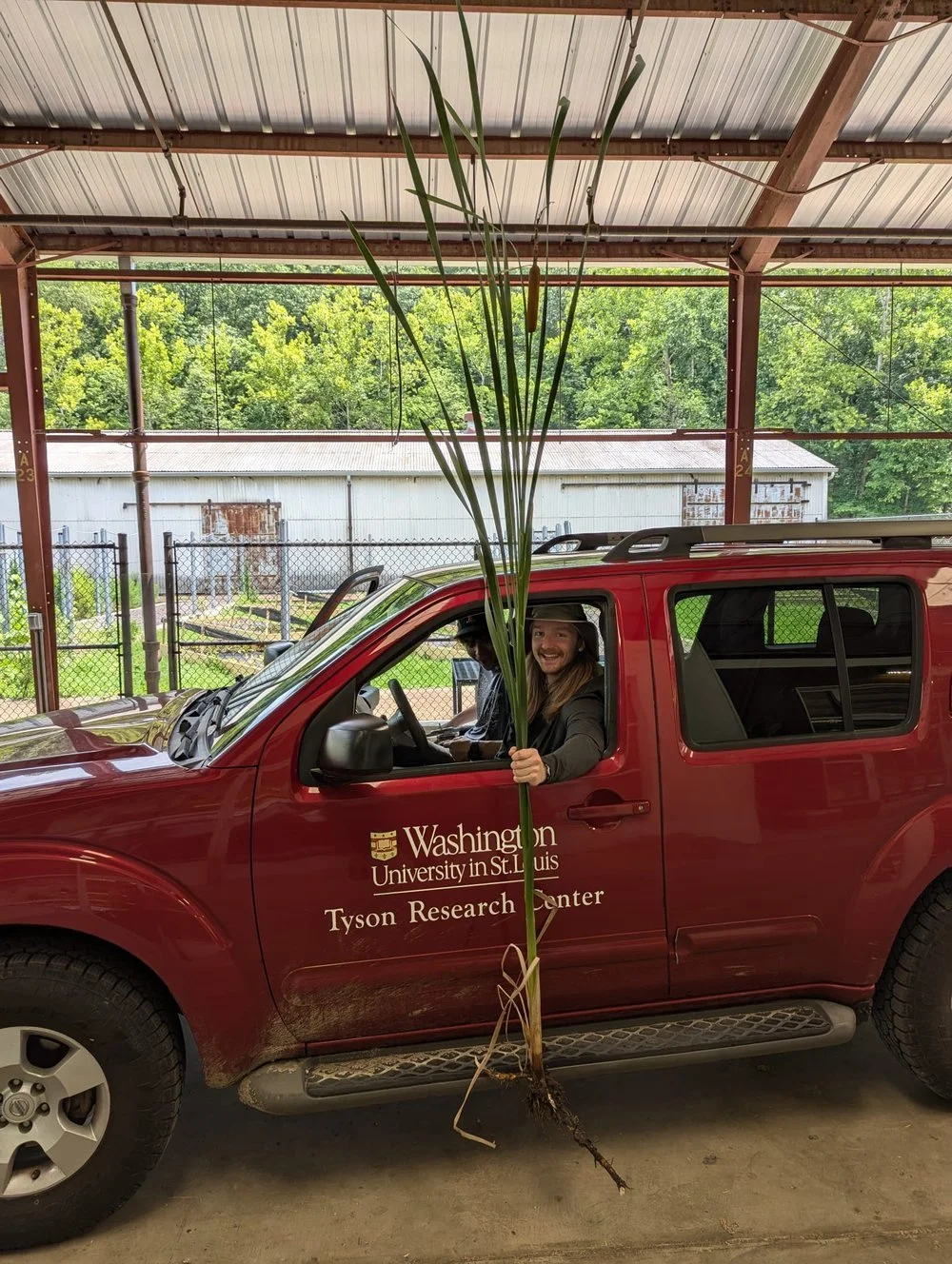Jan 23, 2025
Starting this past fall semester, Tyson Research Center has launched a paid internship program for students in the Tyson Conservation Corps (TCC). The 2024-25 academic year marks an exciting milestone for both Tyson and the selected interns, offering a unique opportunity to gain hands-on experience in environmental research while also receiving financial support for their work.
This new initiative builds on Tyson’s longstanding commitment to fostering student engagement in conservation and research. Historically, Tyson has welcomed students during the school year through informal arrangements with summer fellows who wanted to stay involved. However, as Beth Biro, Tyson staff scientist and founder of TCC, explains, the new internship program formalizes these opportunities to provide a richer and more focused experience.
Beth Biro, Tyson staff scientist and natural resources coordinator, and her dog Booch
(Photo: Stan Strembicki)
“We’ve had students work at Tyson throughout the school year for as long as our summer undergraduate fellowship program has existed,” Beth shares. “But it was often opportunistic—summer students who wanted to continue working for our labs. While this worked well, rethinking TCC allowed us to develop a better model. By offering a few paid internship positions, we can give students a more in-depth experience compared to the broader TCC student group event model, which offers more students a brief overview of conservation and research.”
The new approach also reflects lessons learned in the wake of COVID-19. “Post-COVID, it became difficult to get students to events due to their busy schedules and competing opportunities on campus,” Beth explains. “We decided to try something new by advertising these TCC positions across many WashU departments and offering paid internships to participate in projects year-round. Tyson has so much to offer beyond summer research, and we want students to know they can be involved in different capacities, whether or not they’re available in the summer.”
The 2024-25 academic year cohort consists of seven TCC Interns: Sam Helmkampf (Flora Project), Wilson Tryon (Flora Project), Izzy Borah (Biodiversity Monitoring), Auriel Prepejchal (Biodiversity Monitoring), Sam Ko (Biodiversity Monitoring), Bryn Muller (Mosquito Ecology & Evolution), and Melissa Parkinson (Media & Communications). All interns are current or past undergraduate students at Washington University in St. Louis.
Sam Helmkampf (left), Sam Ko, and Booch
(Photo: Susan Flowers)
Over the course of the fall semester, the TCC interns have made significant contributions to Tyson’s projects. Sam Helmkampf, a senior majoring in Environmental Analysis and a member of the Flora Project, shares, “Our goal is to catalog every vascular plant species on Tyson’s grounds. We hope our contributions provide a frame of reference for researchers, detailing what plants grow here and how they might support future research questions.”
The Biodiversity Monitoring team tackles a variety of projects, from the St. Louis Wildlife Project to deer and bat monitoring. Sam Ko, a returner to Tyson, emphasizes the value of Tyson’s collaborative environment: “I worked at Tyson over the summer and found the work environment to be inclusive, supportive, and so much fun. I love that my role involves both field and lab work, and I’m excited to see how this research impacts urban ecology.”
For the interns, the program offers a refreshing contrast to campus life. “Breaking up my week between class days and Tyson days has reshaped my idea of what a semester can look like,” Ko says. “It’s such a breath of fresh air—literally. I really enjoy spending time outside and learning something new every day.”
“We work with many collaborators throughout the academic year, so bringing students into our professional network gives them a unique experience they might not get over the summer.”
Beth notes that the internship program’s structure highlights Tyson’s versatility and accessibility to students. “We want students to know Tyson is open to all, year-round,” she says. “The more engagement we have on campus, the more we can reinforce that Tyson is a resource for all departments and majors. We work with many collaborators throughout the academic year, so bringing students into our professional network gives them a unique experience they might not get over the summer.”
As the program looks to the future, its potential to grow and offer more opportunities is clear. “Being able to work outside, immerse myself in nature, and contribute to conservation efforts is incredibly invigorating,” Helmkampf says. “It’s a privilege to be part of this program.”
The inaugural class of paid TCC interns reflects Tyson’s commitment to supporting student development while advancing critical environmental research. From botany and biodiversity monitoring to mosquito ecology and social media, these interns are making valuable contributions to understanding and conserving the environment in the St. Louis area and beyond.
You can read more about the 2024-25 TCC Interns here!
About the Author
Melissa Parkinson (she/her) is an undergraduate at Washington University in St. Louis studying Environmental Science and Secondary Education, with a minor in Political Science. She has a strong interest in science communication and education, and is currently serving as Tyson’s Media & Communications Intern.



